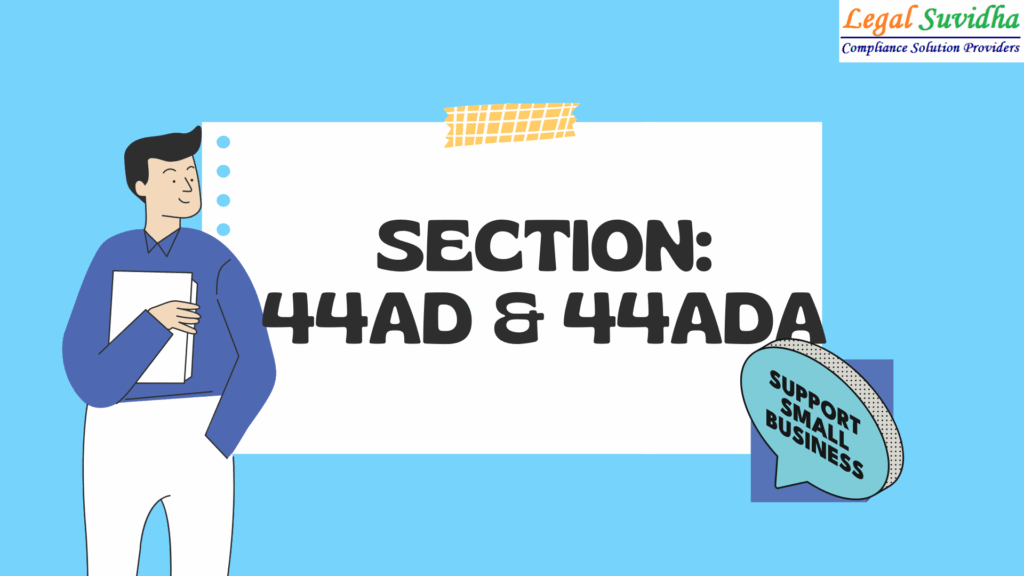AMENDMENT IN SECTION 44AD & 44ADA
Meaning of Presumptive taxation scheme:
As per the Income-tax Act, a person engaged in business or profession is required to maintain regular books of account and further, he has to get his accounts audited. To give relief to small taxpayers from this tedious work, the Income-tax Act has framed the presumptive taxation scheme under sections 44AD, 44ADA and 44AE.
A person adopting the presumptive taxation scheme can declare income at a prescribed rate and, in turn, is relieved from tedious job of maintenance of books of account and also from getting the accounts audited.
For small taxpayers the Income-tax Act has framed two presumptive taxation schemes as given below:
1) The presumptive taxation scheme of section 44AD.
2) The presumptive taxation scheme of section 44ADA.
3) The presumptive taxation scheme of section 44AE.
Presumptive Taxation Scheme of Section 44AD
The presumptive taxation scheme of section 44AD is designed to give relief to small taxpayers engaged in any business (except the business of plying, hiring, or leasing of goods carriages referred to in section 44AE).
The presumptive taxation scheme of section 44AD can be adopted by the following persons :
1) Resident Individual
2) Resident Hindu Undivided Family
3) Resident Partnership Firm (not Limited Liability Partnership Firm)
In other words, the scheme cannot be adopted by a non-resident and by any person other than an individual, a HUF or a partnership firm (not Limited Liability Partnership Firm).
This scheme cannot be adopted by a person who has made any claim towards deductions under section 10A/10AA/10B/10BA or under sections 80HH to 80RRB in the relevant year.
Businesses not covered under the presumptive taxation scheme of section 44AD
The scheme of section 44AD is designed to give relief to small taxpayers engaged in any business, except the following businesses:
> Business of plying, hiring or leasing of goods carriages referred to in section 44AE.
> A person who is carrying on any agency business.
> A person who is earning income in the nature of commission or brokerage Apart from above-discussed businesses, a person carrying on profession as referred to in section 44AA(1)is not eligible for a presumptive taxation scheme.
AMENDMENT IN SECTION 44AD AND SECTION 44ADA:
It is a presumptive income scheme for small businesses.
Applicable to Resident – Individual, HUF & Partnership Firm Gross Turnover or receipt of two crore rupees or less.
Minimum sum to be taxable- 8 % or 6 % of the Turnover or gross receipts are deemed to be the profits and gains from business subject to certain conditions.
We all know that 6 % rate applicable only in case of digital transactions i.e turnover/gross receipt is received by an account payee cheque or an account payee bank draft or use of electronic clearing system through a bank account or through such other electronic mode as may be prescribed.
√ However, Assessee may disclose his business income at more than 8% or 6%, as the case may be, of turnover or gross receipt.
Proposed Amendment in Section 44AD of Income Tax Act, 1961 vide Union Budget 2023
> Threshold limit – Gross Turnover or receipts of two crore rupees increased to Rs three crore rupees but with a condition-
An aggregate of the amount received in cash, does not exceed five percent of the total turnover or gross receipts.
2. Existing Section 44ADA of Income Tax Act, 1961
It is a presumptive income scheme for small professionals.
Applicable to Resident – Individual, HUF & Partnership Firm
Gross receipts in a profession do not exceed Rs 50 lakhs in a previous year
√ Minimum sum to be taxable- a sum equal to 50 % of gross receipts is deemed to profits and gains from business.
√ However, Assessee may disclose his business income at higher sum than 50 %, then that higher sum is taxable.
♦ Proposed Amendment in Section 44ADA of Income Tax Act, 1961 vide Union Budget 2023
> Threshold limit –Receipts from a profession increased to Rs seventy –five lakh rupees but with a condition- Aggregate of amount received in cash, does not exceed five percent of the gross receipts.










